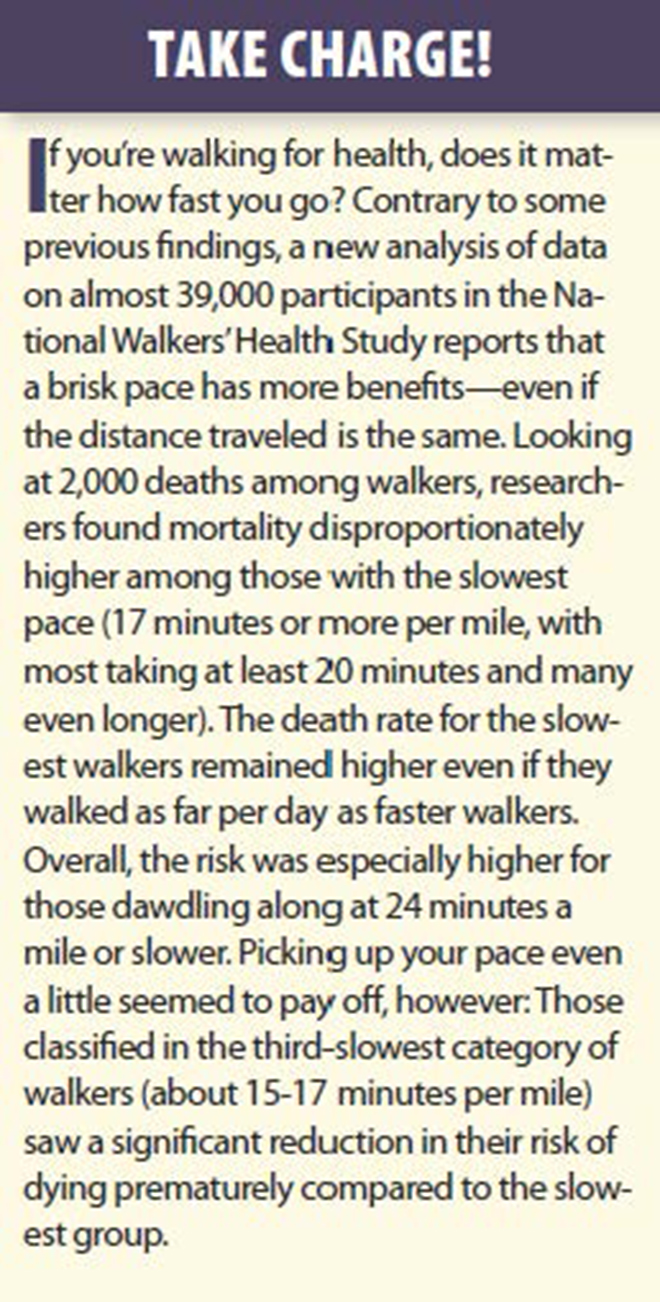A potentially life-saving prescription for fighting heart disease, diabetes and stroke could be as close as those walking shoes gathering dust in your closet. According to an unusual new study, the benefits of exercise in reducing mortality from those leading causes of death match or even exceed the effects of prescription drugs for the same conditions. Patients with heart disease who exercised, for instance, had the same odds of surviving the condition as those given medications such as statins or antiplatelet drugs.

“This doesn’t mean you should stop taking your medications,” comments Miriam E. Nelson, PhD, a professor in Tufts’ Friedman School and author of the “Strong Women” series of books. “But it does suggest how effective exercise can be whether or not it is added to whatever drug regimen your physician prescribes.”
MOVING VS. MEDS: In the new study, published in the journal BMJ, So Huseyin Naci, a graduate student at the London School of Economics and Political Science, and John Ioannidis, MD, DSc, director of the Stanford Prevention Research Center, looked at 305 previous experiments totaling almost 305,000 participants. All were randomized clinical trials, considered the “gold standard” of scientific research. Most, however, focused on medications, with only 57 involving almost 15,000 volunteers testing the benefits of exercise—reflecting, researchers said, how “we need far more information” on the effectiveness of exercise against chronic conditions.
Nonetheless, the pool of prior research was enough for Naci and Dr. Ioannidis to develop an elaborate cross-comparison of outcomes for drugs, exercise or, more rarely, both. Most of the exercise studies involved rehabilitation programs; walking or other aerobic exercises were most commonly studied, but some trials looked at weight training or other routines.

The available studies tracked mortality among patients with heart disease, diabetes, stroke or chronic heart failure. Overall, the results were almost identical for patients assigned to medications and those who exercised. As the researchers put it, “All interventions were not different beyond chance.”
When analyzed by specific diseases, patients with heart disease and diabetes had the same relative risk of dying whether they exercised or took medications. Those who had suffered a stroke actually did better if they exercised, compared to drug treatment—possibly because stroke patients who exercised were healthier to begin with. Only patients with chronic heart failure did not live at least as long in experiments where they exercised compared to those where they were assigned to drugs such as diuretics.
ADDING EXERCISE: “Our results suggest that exercise can be quite potent” in treating such conditions, Dr. Ioannidis said. Co-author Naci added, “Maybe people could think long and hard about their lifestyles and talk to their doctors” about incorporating exercise into their care along with prescription drugs.
Tufts’ Nelson agrees, advising, “You may never have exercised regularly before, or it may be a long time since you did. For that reason, the key to long-term success is to take it slowly but deliberately, increasing the duration and intensity of your exercise a little bit at a time. That will allow you to gain the greatest benefit without burning out. And for aerobic exercise, in particular, choose exercises that you enjoy. That’s also crucial for sticking with it.”
























